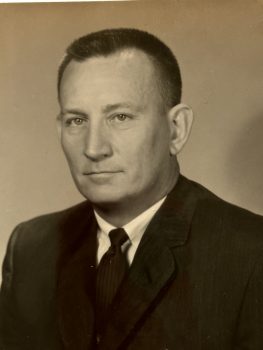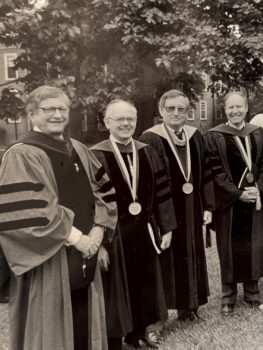
In summer 2024, the Alabama Center for the Advancement of Artificial Intelligence was established, ushering in a new wave of teaching and research centered around AI and machine learning. Housed under the College of Engineering at The University of Alabama, the ALA-AI serves as an interdisciplinary hub dedicated to promoting human-centered applications of AI, ensuring the ethical development of AI technologies, and fostering a vibrant AI research and education community that nurtures collaborations between academia and industry.
While ALA-AI is known for its advanced technologies and an impressive roster of distinguished faculty conducting cutting-edge research, few people realize that it also boasts a unique story behind its inception. The center was established in part through a generous $2 million donation given in memory of a well-respected faculty member, Dr. Marvin A. Griffin.
Following the completion of a doctoral degree in industrial engineering from Johns Hopkins University and work in industry, Griffin began his storied career at UA in 1961 when he was appointed as a professor of industrial engineering in the College of Engineering. After completing a postdoctoral fellowship in computer science and AI at Johns Hopkins University in 1969, he was appointed the inaugural chair of what was then known as the UA Department of Computer Science and Operations Research in 1971, a position he held until 1975. Griffin was a pioneer in the field of computer science, delivering lectures on AI to the United States Department of Commerce and other notable institutions, and he was instrumental in bringing it as a new field of study to UA. His journey — shaped by years of dedicated study, teaching and research — not only helped further the discipline but also influenced countless students and professionals along the way.
Those who had the privilege of working with Griffin viewed him as a pillar of inspiration. Although Griffin was known for being tough and setting high expectations for those who worked with him, he was also respectful of everyone he encountered and was likened to legendary Alabama head football coach Paul “Bear” Bryant for these qualities, his daughter Dr. Margaret Griffin recalled.
His students often found themselves in similar roles to his at universities and jobs across the country after graduating from UA, with many of them attributing Griffin as their source of confidence throughout their careers.
“Marvin recognized my capabilities long before I did and made sure to point me in the right direction,” said Dr. Don Ratliff, one of his former students and retired Regents Professor in the School of Industrial and Systems Engineering at the Georgia Institute of Technology. “His interest in helping young people to achieve their potential is the mark of a great educator.”

Further, multiple students noted that Griffin not only encouraged them to pursue graduate degrees but personally sought out the funding that made it possible for them. Some continued in academia, landing notable leadership roles, such as Dr. John Jarvis, who went on to serve as a professor and the H. Milton and Carolyn J. Steward School Chair in the School of Industrial and Systems Engineering at the Georgia Institute of Technology.
“I remembered an interaction with Marvin around my graduation,” said Jarvis. “I was trying to decide between industry and the Air Force. I finally came to the decision to enlist in the Air Force. During a meeting with Marvin one day, I told him about my decision. I had not spoken about my post-graduation choice with him before this meeting. Well, upon hearing my decision, Marvin said, ‘You are not going into the Air Force. You are going to graduate school!’ I was shocked, but that is what I did … enroll in the master’s in industrial engineering program at Alabama, and when I was finishing my master’s, Marvin said I was going to get my Ph.D. at Johns Hopkins, where he got his, and I did.”
In addition to being remembered fondly by his former students, Griffin’s four children are equally proud of their father and the care and dedication he showed throughout his career.
“My father was always there for his family throughout his life, guiding and supporting us,” said his daughter Barbara Griffin Arnold. “He also hosted his students regularly at our home, where we engaged in many conversations with interesting exchanges of ideas. In addition to his engineering career, he was a consultant to the NASA Flight Program and was elected to the Johns Hopkins Society of Scholars.”
Griffin undoubtedly left a lasting impact long after his time at The University of Alabama was over. While the Department of Computer Science has evolved over the past 50 years, much of its early success and growth can be attributed to Griffin.
He was a leader and innovator who “was always forward thinking about what was next,” Margaret said. “He took advantage of sabbatical leaves to go learn something new, and as department head, he tried to encourage his faculty to do that. He was never going to be left behind. He was always interested. That’s why I think the AI institute is just perfect for him — he would have been all for it.”
Today, as the College and the Department of Computer Science establish ALA-AI as a notable hub for AI research and collaboration, one thing is for certain: Griffin’s legacy will undoubtedly live on through the center and inspire current and future professionals for generations to come.